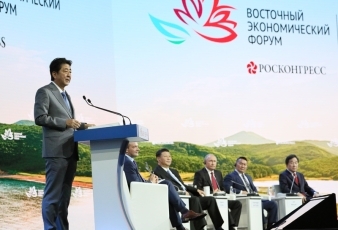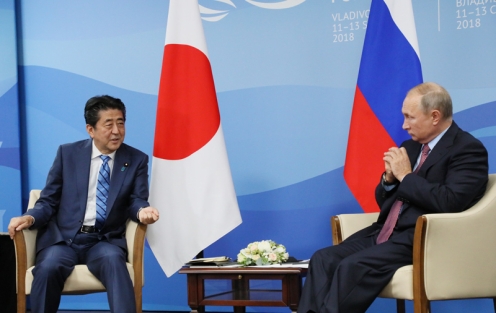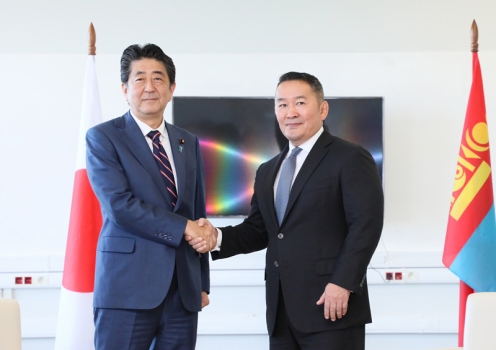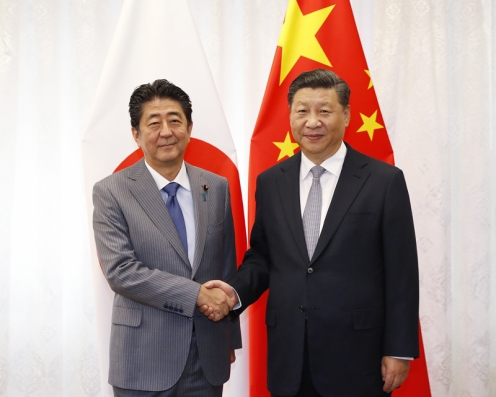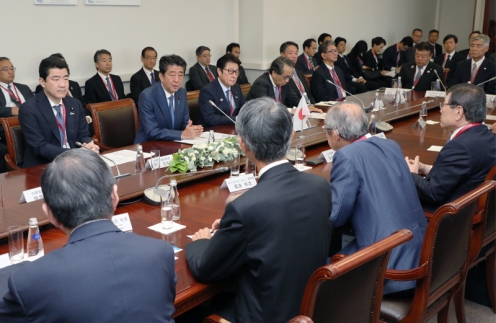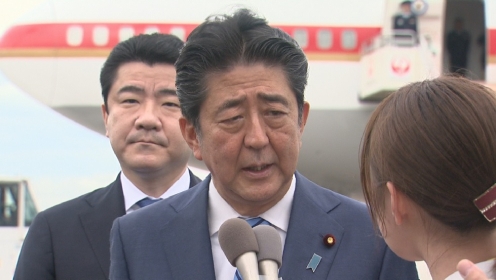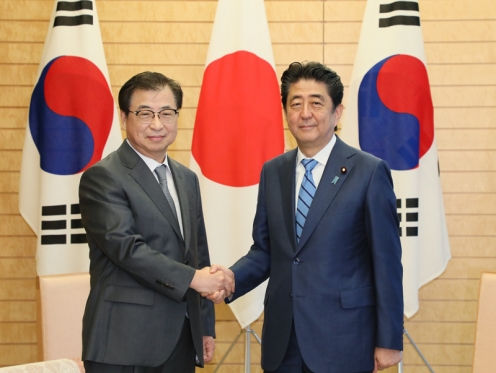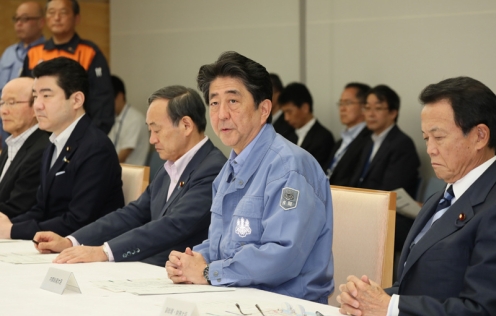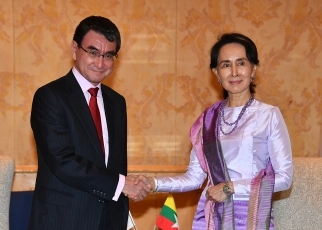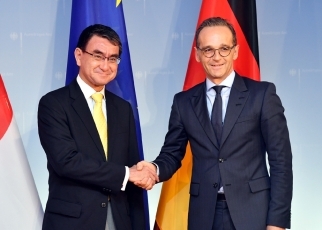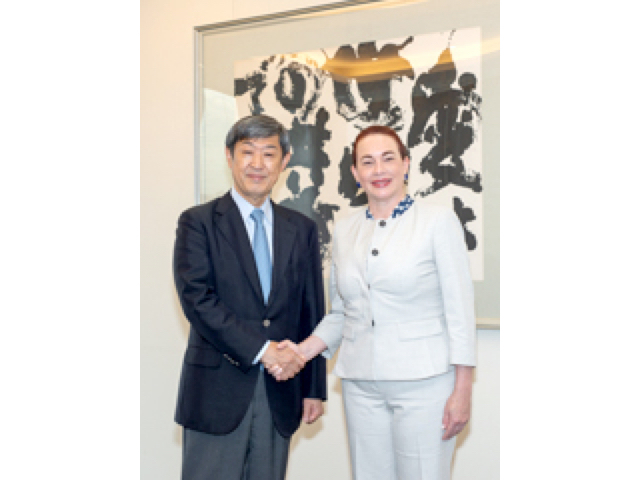Address by Prime Minister Shinzo Abe at the 4th Eastern Economic Forum Plenary Session
Foreign Affairs, Wednesday, September 12, 2018
Mr. Brilev, thank you for your kind introduction.
President Vladimir Putin, President Xi Jinping, President Khaltmaa Battulga, and Prime Minister Lee Nak-yon, it is truly a pleasure to be able to meet you here. Let me begin my remarks by extending my sincere thanks to President Putin, who invited us all here.
I must say all three addresses thus far were at times truly grand in their mindset and provided various kinds of food for thought. They left a deep impression on me and have prompted me to consider Japan’s identity and what kind of country Japan is.
What comes to mind is what I call “a dot connector.”
Points unconnected to anything, or human resources, goods, or capital unconnected to each other. Japan takes those isolated dots and links them, thereby creating added value.
On one occasion, it might be the Yamal Peninsula and Kamchatka, for instance. These may be two points on a plane.
Or these could be an artificial satellite and someone’s house in Siberia, in three-dimensional space. What materializes is connectivity -- LNG, in the first case, and Internet access, in the second.
Across the landscape of Eurasia, across the seascape of the Indo-Pacific, where we find Japan, and across outer space and cyber space, under which all of us fall, connectivity is evolving, bringing forth new linkages and new connections. We are living in an age in which added value arises from bringing things together.
My hope for Japan in the coming years is for us to be a magnificent dot connector. In this role we will foster associations between points that have never come together before and link knowledge with other, heretofore unconnected knowledge, all on the basis of fair and aboveboard rules.
President Putin, this is precisely why we can look forward to great synergy arising through Japan and Russia cooperating with each other. Later in these remarks I will emphasize this point.
From now, I would like to use the first half of my time to discuss the future. I will focus here only on the future.
Next year, you will see in Japan the succession to the Imperial throne. You will also see the G20 Osaka Summit convene, a meeting to which I will be inviting President Putin and President Xi.
After we bid farewell to summer, the curtain will open on the Rugby World Cup. The opening match on September 20 at Tokyo Stadium pits the host nation Japan against an opponent I’d like to introduce to you here, and that is Russia. Let us each put up a good hearty fight.
And just after that, the year 2020 is the year of the Tokyo Olympic and Paralympic Games. Young people from all around the world will gather in Tokyo to hold a festival celebrating both sports and peace.
Your excellencies here on the stage, and ladies and gentlemen in the audience today, Japan now stands at a historic turning point.
Here at this historic juncture, I am determined to build peace and prosperity in the East Asia of the 21st century.
First, I will address Japan’s relations with China.
During my first administration, I visited China immediately after taking office as prime minister, and put forth the approach of a “mutually beneficial relationship based on common strategic interests.” China’s People’s Daily called that visit an “ice breaking trip.”
However, at the inauguration of my second administration upon becoming prime minister again, Japan-China relations were in a state of real difficulty that could even be called the worst relationship we had had since the end of the war.
Wanting somehow to improve Japan’s ties with China, I have worked hard at this over the years. The reason is that Japan and China share great responsibility for the peace and prosperity of this region and indeed the entire world.
The countries of Asia also have expectations for Japan and China to stably develop friendly relations. We will live up to those expectations, develop our cooperative relations across the entire spectrum of fields, and contribute to the peace and prosperity of the region and the world. That is my conviction.
The meeting I held with President Xi Jinping at the Da Nang APEC meeting in November last year was a superb opportunity that became a “new start” for Japan-China relations.
In May this year, Premier Li Keqiang, visiting Japan on the first such visit for a Chinese premier in eight years, said that Japan-China relations have returned to their “normal path” and I agree with him entirely.
Earlier today, President Xi and I succeeded in holding highly significant talks regarding Japan-China relations and the various issues that we face together.
In response to China’s gracious invitation, I intend to visit China this year, the year in which we commemorate the 40th anniversary of the conclusion of the Treaty of Peace and Friendship between Japan and China.
After that, I very much wish to invite President Xi to Japan. Through this exchange of visits at the leaders' level, I hope to raise Japan-China relations to a new stage. I am firmly determined in this regard.
If we are to make the peace and prosperity of this region in the 21st century something firm, we cannot skirt around North Korean issues.
In Singapore in June a historic summit took place between the United States of America and North Korea. I endorse this summit as a forward-looking step towards the resolution of the abductions, nuclear, and missile issues.
While President Donald Trump engaged in confidence building with Chairman Kim Jong-un, he also shared with him the bright future that would emerge through denuclearization and urged Chairman Kim to take action. In so doing, he adopted a new approach that no one else had tried before.
Through President Trump’s decisive judgment, the relations between North Korea and the international community are now poised to move forward significantly. I very much hope that North Korea seizes this opportunity.
My own belief is that no nation is blessed with as much potential as North Korea to change its future into one of hope. North Korea enjoys copper, gold, iron ore, and abundant mineral resources. Its population of 25 million will no doubt become one of the world’s leading hardworking labor forces.
Today, let all of us gathered here pledge to continue talking to North Korea in a single voice so that it is able to walk the path of a future filled with hope. Let us mutually confirm that we will engage with North Korea with an attitude that does not waver.
What should we do to make that a reality? It is an absolute imperative that we achieve the complete denuclearization of the Korean Peninsula, whatever it takes. On this point, President Putin, President Xi, and I are all in complete agreement. I have great expectations that the Inter-Korean Summit that will be held in Pyongyang in the near future will lead to concrete actions towards the denuclearization of the Korean Peninsula.
Between Japan and North Korea lies the abductions issue. This too must be resolved. Within that context, I am determined for us to take steps towards settling the unfortunate past with North Korea and normalizing our relations.
I too must break the shell of mutual distrust, take a step forward, and ultimately meet with Chairman Kim Jong-un. At present, nothing has been decided regarding a Japan-North Korea summit meeting, but if we are going to hold one, then I am resolved it must be a meeting that contributes to the resolution of the abductions issue.
What is essential for lasting peace and prosperity in the Northeast Asia region is for the leaders of the region, including the five of us who are here today, to take steps all heading towards the same direction. I will spare no efforts towards that end. I make that pledge here today.
Next, allow me to address Japan’s relations with Russia.
For Japan, as we lay the foundation for the peace and prosperity of this region in the 21st century, our relations with Russia hold unlimited potential.
Over the long stretch of more than 70 years since the end of World War II, Japan and Russia have yet to conclude a peace treaty between them. President Putin and I agree in our belief that this is an abnormal state of affairs.
In December 2016, I welcomed President Putin to my hometown of Nagato. There, the two of us discussed in great depth the future of Japan-Russia relations. We decided to launch consultations on the special system for engaging in joint economic activities on the Four Northern Islands, and pledged to make it possible for former island residents to freely visit grave sites. There in Nagato we also shared an earnest determination towards resolving the issue of the peace treaty.
Ladies and gentlemen, these promises we made in Nagato are now steadily coming to be carried out.
Japan-Russia relations are beginning to advance at a degree of acceleration never seen before. The plans for bilateral cooperation that President Putin and I pledged to undertake now number more than 150. Of these, more than half are already actually underway or truly right on the verge of being launched.
I have a video for you to see what I have just said.
How does that strike you? You might have noticed a single common thread running through those projects, connecting them all. Bringing the eight-point cooperation plan into realization will enable you to feel in a tangible way “improvements in Russians’ quality of life.”
Russia and Japan are now about to produce conclusive evidence to the people of Russia, and by extension, to the entire world.
It will be evidence that when Russia and Japan join hands, Russian people become healthier, Russian cities become more comfortable, and Russian small- and medium-sized enterprises become dramatically more efficient.
By cooperating with Japan, Russia’s underground resources will reach cities around the globe with even greater efficiency.
Through Japan-Russia cooperation, here, Vladivostok, and locations all around Far East Russia will become gateways where human resources, goods, and capital come together.
Japan and Russia are now truly poised to produce tremendous amounts of evidence, and yes, the dream of “digital Russia” will come to bear fruit even sooner.
While the potential Japan and Russia enjoy is found only rarely in other bilateral relations, there is one obstacle that remains even now, hindering this potential from coming into full bloom. And to repeat myself, ladies and gentlemen, that is nothing other than the fact that our two countries have yet to conclude a peace treaty.
It was May 25 earlier this year at the St. Petersburg International Economic Forum that in my remarks I urged the audience to imagine.
I called on them to hope and imagine how the world will look when a lasting stability comes to take hold between Japan and Russia.
At that time, we will have established a pillar of peace in a major corner of the northern and eastern hemispheres. That will be promising indeed as a substantial pillar that underpins the region and also the world.
The Arctic Ocean to the Bering Sea, the North Pacific, and the Sea of Japan will together form a major, arterial sea road of peace and prosperity.
The islands that used to be a source of conflict will have found bright potential as a logistics hub, transforming into a symbol of Japan-Russia cooperation. The Sea of Japan will also most likely change dramatically as a highway sending goods back and forth.
And beyond that is the arrival on the world stage of a huge region brimming with peace, prosperity, and dynamism, governed by free and fair rules, that connects to China, the Republic of Korea, Mongolia, and the countries of the Indo-Pacific region.
President Putin, here, with this sizable audience as our witnesses, let us once again confirm with each other our intention to make this a reality.
Let us walk forward together mindful of the questions, “If we don’t do it now, then when?” and “If we do not do it, then who will?”
We are both fully aware that it will not be easy. However, we have a duty to future generations. We have the duty to completely clear away from Northeast Asia the postwar scenes and change the future to one truly filled with hope.
Ladies and gentlemen, no longer can we allow our children to be troubled endlessly under the same standstill in Japan-Russia relations that troubled our generations.
Several achievements in the video you just watched are really just like a preview to the great undertakings we will be able to achieve if both our countries put our minds to resolving this issue. Let us make the potential that we hold bloom more fully.
The meeting President Putin and I just held was our 22nd. We will keep taking advantage of various opportunities and continue to engage in talks again and again.
I urge you all to support our steps towards concluding a peace treaty. I ask for a hearty round of applause from everyone here in support of this. Thank you very much.
In 2020, the face of Tokyo will have become entirely renewed for the Olympic and Paralympic Games. Not only will self-driving cars run through the streets, but quite possibly, they will also transform into vehicles that fly and take to the skies.
In Japan now the curtain is about to be raised on a new era, thanks to Japan’s new generation and thanks also to the people from all around the world that visit Japan.
I appeal to young Russians in as loud a voice as I can muster. Come to Japan to live, to learn, and to work, and help build a new Japan, together with the Japanese.
The future is another word for hope. Bringing up young people able to have that wholehearted conviction is the weightiest responsibility held by all those leading a nation.
I want the young generation about to be born in Japan, hand in hand with the youth of Russia, of China, of the Republic of Korea, and of Mongolia, to bring even greater peace and prosperity to Asia and the world and become the driving force that before long gives rise to an era truly filled with hope. I look forward to this kind of future each and every day without fail. I am prepared to work hard, giving everything I have got, in the future as well.
I will see you all again. Thank you very much.
Eastern Economic Forum and Other Events: First Day
Cabinet Secretariat, Monday, September 10, 2018
[Provisional Translation]
On September 10, 2018 (local time), Prime Minister Shinzo Abe visited Vladivostok in the Russian Federation to attend the fourth Eastern Economic Forum and other events.
The Prime Minister first visited an engine plant with H.E. Mr. Vladimir Vladimirovich Putin, President of the Russian Federation. Afterwards, the Prime Minister held a summit meeting with President Putin and then held an exchange of documents ceremony and a joint press announcement.
Eastern Economic Forum and Other Events: Second Day
Cabinet Secretariat, Tuesday, September 11, 2018
[Provisional Translation]
On September 13, 2018 (local time), Prime Minister Shinzo Abe, who is visiting Vladivostok in the Russian Federation to attend the fourth Eastern Economic Forum and other events, met with people involved with Japanese businesses and others, and thereafter paid a visit to the memorial monument for Japanese nationals who died during detainment.
In his address at the meeting with people involved with Japanese businesses and others, the Prime Minister said,
“I am extremely pleased that members of Japanese companies and universities who are engaged in businesses and exchanges with Russia have attended the Eastern Economic Forum in continuation from the last year and I have the opportunity to meet all of you here at this occasion.
Two years ago, at the Plenary Session of this Economic Forum, I proposed to President Putin that we review the progress of the eight-point cooperation plan every year in Vladivostok. Thanks to all of your proactive efforts and hard work, the cooperation plan is steadily moving from ideas on paper to something tangible. As I proposed confirming the progress every year, I worried what I would do if there was no substantial progress made in the following year, but it is truly thanks to the efforts made by all of you that we are making steady progress and delivering results, and I believe those results have been sufficiently recognized by Russia, including President Putin.
Even focusing on Vladivostok, for instance, we presented a future vision for this city at the end of last year. We also have actual projects progressing. I have heard that the rehabilitation center, which was opened by the JGC Corporation and Hokuto Hospital in May, is so popular that they do not have enough staff to meet the demand. Smart signals, which were proven effective in Voronezh, were installed too. When these signals are utilized with appropriate traffic administration by the Government, we can expect an improvement in traffic congestion in Vladivostok. At the summit meeting held on September 10, I also confirmed the progress of the cooperation plan with President Putin.
We also took the opportunity for this Economic Forum to exchange diplomatic notes concerning the tax convention which will come into effect on the 10th of next month. The Government would like to further enhance the business environment to provide even greater momentum to the progress of Japan-Russia relations and economic relations between Japan and Russia.
Two years ago, I held a summit meeting with President Putin in Nagato. Regrettably, our conventional approach could not make progress on the territorial issues for seventy years and thus these seventy years have now passed without concluding a peace treaty. Today, after seventy years, it is important to resolve this issue that we advance the understanding of the citizens of our two countries, and prepare the conditions for resolution. At the summit meeting, we were determined to break the shell of suspicion that exists between us and progress one step forward and the joint economic activities on the four islands of the Northern Territories are one aspect of these efforts. We have promoted the eight-point cooperation plan with the determination to make major progress towards the resolution of the peace treaty issue by sharing the recognition that the cooperation between Japan and Russia enables us to deliver major results and enrich people’s lives. This determination has brought us thus far, and I would like to once again offer my deep gratitude for all of your efforts.
Today, I would like to ask you all to share your requests and opinions regarding our initiatives and plans, and anything you might ask to Russia regarding business and exchange with Russia. Thank you very much.”
Eastern Economic Forum and Other Events: Third Day
Cabinet Secretariat, Wednesday, September 12, 2018
[Provisional Translation]
On September 12, 2018 (local time), Prime Minister Shinzo Abe, who is visiting Vladivostok in the Russian Federation to attend the fourth Eastern Economic Forum and other events, held a summit meeting with H.E. Mr. Xi Jinping, President of the People's Republic of China. The Prime Minister then attended the plenary session of the fourth Eastern Economic Forum and gave a speech. Afterwards, he attended the International Jigoro Kano Junior Judo Tournament.
Following his summit meeting with President Xi, the Prime Minister said,
“A while ago, I held a summit meeting with President Xi. We had a frank exchange of views in a very relaxed atmosphere. Japan and China have an inseparable relationship, weaving history as neighbors for a long time. The fact that Japan and China have steadily advanced close cooperation towards peace and prosperity in the world, I believe, reflects our common understanding that we share the responsibility as the second and third largest economies in the world. We renewed our understanding that, under such broad perspective, Japan and China would deepen our friendly and cooperative relations. Furthermore, we also had an exchange of views on not only regional but also various global issues.
In addition, regarding the North Korean issue, we agreed that the denuclearization of the Korean Peninsula is a common goal of Japan and China and closely work together moving forward. There is no change to Japan’s policy of aiming for normalization of diplomatic relations based on the Japan-DPRK Pyongyang Declaration. Based on that, I also obtained China’s complete support regarding Japan’s position on the early resolution of the abductions issue.
Japan-China relations have been steadily improving since I held a summit meeting with President Xi in Da Nang, Viet Nam in November last year, and we marked a new start for Japan-China relations. Not only was the first Summit Telephone Talk held, but we also moved in the direction for major improvements in every field of Japan-China relations, including politics and the economy. President Xi stated that, on the occasion of the 40th anniversary of the Treaty of Peace and Friendship between Japan and China, he welcomed my visit to China next month, reflecting the relationship of trust built up between us . We agreed on advancing coordination toward my visit to China. By elevating our relations, which are steadily progressing towards a new level through the mutual visits of the two leaders, I would like to lay the foundation of the peace and prosperity of Northeast Asia”
Eastern Economic Forum and Other Events: Fourth Day
Cabinet Secretariat, Friday, September 14, 2018
[Provisional Translation]
On September 13, 2018 (local time), Prime Minister Shinzo Abe, who is visiting Vladivostok in the Russian Federation to attend the fourth Eastern Economic Forum and other events, met with people involved with Japanese businesses and others, and thereafter paid a visit to the memorial monument for Japanese nationals who died during detainment.
In his address at the meeting with people involved with Japanese businesses and others, the Prime Minister said,
“I am extremely pleased that members of Japanese companies and universities who are engaged in businesses and exchanges with Russia have attended the Eastern Economic Forum in continuation from the last year and I have the opportunity to meet all of you here at this occasion.
Two years ago, at the Plenary Session of this Economic Forum, I proposed to President Putin that we review the progress of the eight-point cooperation plan every year in Vladivostok. Thanks to all of your proactive efforts and hard work, the cooperation plan is steadily moving from ideas on paper to something tangible. As I proposed confirming the progress every year, I worried what I would do if there was no substantial progress made in the following year, but it is truly thanks to the efforts made by all of you that we are making steady progress and delivering results, and I believe those results have been sufficiently recognized by Russia, including President Putin.
Even focusing on Vladivostok, for instance, we presented a future vision for this city at the end of last year. We also have actual projects progressing. I have heard that the rehabilitation center, which was opened by the JGC Corporation and Hokuto Hospital in May, is so popular that they do not have enough staff to meet the demand. Smart signals, which were proven effective in Voronezh, were installed too. When these signals are utilized with appropriate traffic administration by the Government, we can expect an improvement in traffic congestion in Vladivostok. At the summit meeting held on September 10, I also confirmed the progress of the cooperation plan with President Putin.
We also took the opportunity for this Economic Forum to exchange diplomatic notes concerning the tax convention which will come into effect on the 10th of next month. The Government would like to further enhance the business environment to provide even greater momentum to the progress of Japan-Russia relations and economic relations between Japan and Russia.
Two years ago, I held a summit meeting with President Putin in Nagato. Regrettably, our conventional approach could not make progress on the territorial issues for seventy years and thus these seventy years have now passed without concluding a peace treaty. Today, after seventy years, it is important to resolve this issue that we advance the understanding of the citizens of our two countries, and prepare the conditions for resolution. At the summit meeting, we were determined to break the shell of suspicion that exists between us and progress one step forward and the joint economic activities on the four islands of the Northern Territories are one aspect of these efforts. We have promoted the eight-point cooperation plan with the determination to make major progress towards the resolution of the peace treaty issue by sharing the recognition that the cooperation between Japan and Russia enables us to deliver major results and enrich people’s lives. This determination has brought us thus far, and I would like to once again offer my deep gratitude for all of your efforts.
Today, I would like to ask you all to share your requests and opinions regarding our initiatives and plans, and anything you might ask to Russia regarding business and exchange with Russia. Thank you very much.”
Press Conference on Attending the Eastern Economic Forum and Other Matters
Cabinet Secretariat, Monday, September 10, 2018
[Provisional Translation]
On September 10, 2018, Prime Minister Shinzo Abe held a press conference at Tokyo International Airport (Haneda Airport).
With regard to his attendance at the Eastern Economic Forum and other matters, the Prime Minister said,
“President Putin and I expressed our sincere determination to conclude a peace treaty between Japan and Russia by ourselves, at our summit meeting in Nagato two years ago. Since then, Japan-Russia relations and the peace treaty issue have shown steady progress. While this will be my 22nd meeting with President Putin, joint economic activities on the four islands of the Northern Territories have reached a new level, and special grave visits by airplane have been conducted for two consecutive years. With respect to the eight-point cooperation plan, we are seeing progress. We will conclude a peace treaty while advancing Japan-Russia relations in every field. We will resolve the territorial issue and conclude a peace treaty. I intend to move steadily forward in that direction.
I also intend to further advance Japan-China relations, which are now entering a new phase, by holding talks with President Xi Jinping this year, which marks the 40th anniversary of the Treaty of Peace and Friendship between Japan and the People’s Republic of China. Some time ago, Premier Li Keqiang visited Japan, and, this time, I will hold talks with President Xi Jinping in Vladivostok. I hope to steadily advance Japan-China relations further by subsequently visiting China sometime this year.
At the Eastern Economic Forum, the leaders of Japan, Russia, China, the Republic of Korea, and Mongolia will come together in one place, along with 6,000 businesspeople. At the Forum, I will present the views of Japan, which lay the foundations for the peace and prosperity of this region.”
Courtesy Call from the Director of the National Intelligence Service of the ROK
Cabinet Secretariat, Monday, September 10, 2018
[Provisional Translation]
On September 10, 2018, Prime Minister Shinzo Abe received a courtesy call from Mr. Seo Hoon, Director of the National Intelligence Service of the Republic of Korea (ROK), at the Prime Minister’s Office.
Seventh Meeting of the Ministerial Council on the 2018 Hokkaido Eastern Iburi Earthquake
Cabinet Secretariat, Sunday, September 9, 2018
[Provisional Translation]
On September 9, 2018, Prime Minister Shinzo Abe held a meeting of the Ministerial Council on the 2018 Hokkaido Eastern Iburi Earthquake at the Prime Minister’s Office.
The Prime Minister said in his opening address,
“The 2018 Hokkaido Eastern Iburi Earthquake has claimed the lives of 42 people to date. Once again, I would like to express my heartfelt condolences to those who lost their lives as well as my sympathies to all those who have been affected by this disaster. Our front-line personnel will continue to exert every effort for finding and rescuing missing persons as quickly as possible.
Today, I visited some of the areas affected by the disaster, and witnessed with my own eyes the immense damage left by the earthquake, which had a maximum seismic intensity of 7. I also heard firsthand the earnest wishes and anxiety of those affected by the disaster, including those who have suffered great pain from losing family members in the landslides, those who have experienced much fear, and those who are leading difficult lives at evacuation centers due to the impact of power conservation efforts and water outage. We need to further accelerate the speed of the emergency responses and recovery.
The Government will continue to exert all-out efforts to ensure that all those who have been affected by the disaster can return to their normal lives and live with peace of mind at the earliest possible date.
With regard to electricity, power supply has been restored across all parts of Hokkaido, thanks to the efforts of the relevant parties. Supply is, however, still falling short of actual peak levels of demand prior to the earthquake. Therefore, I ask for the cooperation of all households, workplaces and industrial facilities to save energy by 20% compared to normal periods. The Government, in cooperation with the local governments, will provide thorough explanations and ensure that the information is fully disseminated.
With regard to waterworks, as a result of the restoration of power supply and repair works carried out on water pipes, water supply has been successfully restored for about 53,000 households to date. At the same time, approximately 8,000 households are still without running water. Having restored power supply, we are now doing our utmost to restore water supply as well, at the earliest possible date, so that those affected by the disaster can return to their normal lives.
To accelerate the recovery and reconstruction of the affected areas, it is important to prepare measures that enable the affected municipalities to exert every effort for emergency response and recovery measures, without worrying about their finances. To that end, I have issued instructions to promptly move up the provision of regular local allocation tax.
In addition, with the aim of further strengthening push-mode support for supplies that are indispensable to the lives and living environment of those affected by the disaster, tomorrow we will approve the use of 540 million yen of contingency funds. The Government will continue to provide the assistance needed to cover any necessary expenses that may arise during the recovery work.
I would like to ask each of you to swiftly grasp the needs on the ground, which are constantly changing, and immediately implement the necessary measures, while paying attention to the feelings of those affected by the disaster.”
New Tax Convention with Russia will Enter into Force
Ministry of Finance, Tuesday, September 11, 2018
[Provisional translation]
1. On September 10, the exchange of diplomatic notes between the Government of Japan and the Government of the Russian Federation for entry into force of the Convention between the Government of Japan and the Government of the Russian Federation for the Elimination of Double Taxation with respect to Taxes on Income and the Prevention of Tax Evasion and Avoidance (signed on September 7, 2017) took place in Vladivostok.
2. This Convention, accordingly, will enter into force on October 10, 2018 (the thirtieth day after the date of exchange of diplomatic notes) and will have effect:
(a) with respect to taxes levied on the basis of a taxable year, for taxes for any taxable years beginning on or after
January 1, 2019; and
(b) with respect to taxes levied not on the basis of a taxable year, for taxes levied on or after January 1, 2019.
(c) The provisions concerning the exchange of information and the assistance in the collection of taxes have effect
from October 10, 2018, without regard to the date on which the taxes are levied or the taxable year to which the
taxes relate.
* This new Convention will not affect the application of the existing Convention (Convention between the Government of Japan and the Government of the Union of Soviet Socialist Republics for the Avoidance of Double Taxation with respect to Taxes on Income) between Japan and the countries other than the Russian Federation.
Information on the 2018 Hokkaido Eastern Iburi Earthquake
Cabinet Secretariat, Friday, September 14, 2018
[From Hokkaido Government]
If you're in Hokkaido and need information in English, Mandarin or in Korean, you can call the numbers at the Hokkaido Disaster Prevention Information: 011-204-5937, 011-204-5092
English service is available 24 hours. (Mandarin or Korean service is provided from 8:45 to 17:30, weekday only)
Please note the services are for foreigners in Hokkaido only.
[Latest information for Foreign Residents and Visitors]
NHK World is providing latest information with respect to the 2018 Hokkaido Eastern Iburi Earthquake including various supports and latest update on transportation in English.
NHK World Japan advises those in the affected areas to check with their local municipalities for updates and advisories.
More links are available on source website.
Foreign Minister Kono Meets with the State Counsellor and Union Minister for Foreign Affairs of Myanmar Aung San Suu Kyi
Foreign Affairs, Wednesday, September 12, 2018
On September 12, Mr. Taro Kono, Minister for Foreign Affairs, during his visit to Hanoi, the Socialist Republic of Viet Nam, to attend the World Economic Forum on ASEAN (the Association of Southeast Asian Nations), held a meeting commencing at 2 p.m. for approximately 25 minutes with H.E. Ms. Aung San Suu Kyi, State Counsellor and Union Minister for Foreign Affairs, Republic of the Union of Myanmar. The overview of the meeting is as follows.
At the beginning, Minister Kono expressed expectation that State Counsellor and Foreign Minister Aung San Suu Kyi's visit to Japan on the occasion of the Mekong-Japan Summit Meeting next month would be meaningful, and State Counsellor and Foreign Minister Aung San Suu Kyi replied that visiting Japan would be a pleasure.
Following that, with regard to the situation in Rakhine State, Minister Kono appreciated the commencement of initial assessments by the United Nations High Commissioner for Refugees (UNHCR) and the United Nations Development Programme (UNDP) in 13 villages in northern Rakhine State, and noted the importance of actually starting assistance by the UN agencies and of demonstrating progress of creating environment for the repatriation to the international community in a visible way in the future. Subsequently, Minister Kono welcomed the commencement of activities by the Independent Commission of Enquiry (ICOE), and requested the cooperation of the Government of Myanmar and Myanmar military through providing necessary information to the ICOE. Minister Kono also encouraged State Counsellor and Foreign Minister Aung San Suu Kyi to showcase her government's efforts to the international community. In addition, Minister Kono expressed his concern on the conviction handed down to the two Reuters journalists in Myanmar.
In response, State Counsellor and Foreign Minister Aung San Suu Kyi stated that Myanmar would cooperate with UN agencies, would make progress on repatriation of the displaced persons in accordance with the Memorandum of Understanding with Bangladesh, and had granted the ICOE a broad mandate.
Japan-Germany Foreign Ministers’ Meeting
Foreign Affairs, Thursday, September 6, 2018
On September 6, Mr. Taro Kono, Minister for Foreign Affairs, during his visit to the Federal Republic of Germany, held a foreign ministers’ meeting for approximately 40 minutes commencing at 6:05 p.m. local time (1:05 a.m. on September 7, Japan time) with H.E. Mr. Heiko Maas, Federal Minister for Foreign Affairs, Federal Republic of Germany.The overview of the meeting is as follows.
1. Beginning
At the beginning, Minister Maas offered words of condolence regarding the damage caused by the recent typhoon and the earthquake damage in Hokkaido, and Minister Kono expressed his appreciation.
2. Bilateral and Japan-European Union (EU) relations
(1) The two ministers shared the view that they will promote cooperation between Japan and Germany on support for reform in the Western Balkans , which aim to join the EU, and on intraregional cooperation, and that their Ambassadors in charge of the Western Balkans will hold consultations to that end.
(2) In light of the signing of the Japan-EU Economic Partnership Agreement (EPA), the two ministers confirmed that they will both make efforts towards the early entry into force of the Agreement.
(3) In addition, they shared the view that Japan and Germany will strengthen cooperation in the lead-up to the G20 Summit that will be held in Osaka next year.
3. Regional situations
The two ministers exchanged views on topics such as the situation in Syria and the Iran nuclear deal.
4. Cooperation in the international arena
(1) The two ministers shared the view that Japan and Germany will cooperate to advance United Nations Security Council reform as members of the G4.
(2) They confirmed that they will continue to cooperate in order to increase momentum for promoting the entry into force of the Comprehensive Nuclear-Test-Ban Treaty (CTBT).
JICA President Kitaoka Holds Talks With UN General Assembly President-Elect Espinosa
JICA, Monday, September 10, 2018
JICA President Shinichi Kitaoka held talks with María Fernanda Espinosa Garcés, the president-elect of the United Nations General Assembly, at JICA Headquarters in Tokyo on Aug. 30.
They discussed various reforms at the U.N. to promote sustainable development. They agreed that to achieve the SDGs, not only traditional donors but also emerging countries will play an important role and that it is vital to share common norm that incorporates environmental and social considerations as well as a debt-sustainability perspective. At the same time, they affirmed the importance of the U.N. in maintaining multilateralism. Moreover, regarding protracted and worsening refugee issues, they affirmed the effectiveness of the support for refugee self-reliance JICA has engaged in, including vocational training and assistance to host communities, and Ms. Espinosa expressed her expectation that JICA will continue to play an important role in this field.
JICA will continue working in tandem with the U.N. to solve global issues and achieve the SDGs.

























